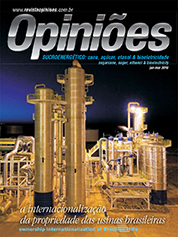Mario Lindenhayn
President of BP Biofuels Brasil
Op-AA-23
BP and its view of Brazilian Ethanol
The world is in search of efficient and competitive solutions to reduce greenhouse gas emissions and mitigate climate change impacts. A part of this effort lies in looking for low carbon energy sources that are safe, competitive and available on a large scale. For fuels, such competitive option is available: ethanol from sugarcane produced in Brazil.
Brazil pioneered the production of ethanol. In the past 40 years, the country adopted the fuel in its energy matrix, developed a market for vehicles adapted to this fuel and consolidated an important production and export base. From BP’s vantage point, ethanol entails considerable synergies with its core business. BP believes the country is strategic and therefore plans on investing quite considerably in this market by the end of the decade.
We began our operations in this industry in 2008, when we acquired a 50% stake in the joint venture company Tropical Bioenergia, which will produce 435 million liters of ethanol per year. BP’s strategic objective is to assist in boosting the biofuel business based on sugarcane in Brazil, seeking to increase productivity, offering new technologies and making the product a global commodity.
We believe it is quite possible to conciliate what best there is in terms of ethanol production in Brazil with what BP has to contribute based on its experience of 100 years in the oil, gas and fuel markets. In the process of making ethanol a global commodity, Brazil will have to improve its practices in health, safety and the environment. The company Tropical was conceived from the onset to operate with high standards in this regard.
That is why the company made investments during the first year of activities, having reached a mechanization index of almost 100%. In terms of safety standards, the company has a RIF (recordable injury frequency) index well below the industry average. BP believes that the biofuel industry will grow exponentially. Just how much will depend on many variables, including technological progress and the development of specific policies.
A great number of projections foresee that biofuels will make up approximately 20% of the fuel matrix by 2020. At BP, we reckon a penetration of 30% between 2030 and 2050 is possible, with the adequate level of investment in advanced technologies and infrastructure development. BP is investing in the development of second generation biofuels that may become available in the Brazilian market, such as biodiesel, ligno-cellulosic ethanol and biobuthanol, a new molecule that will allow opening markets that as yet do not consume ethanol.
Making ethanol a commodity will allow developing mechanisms to perform in a future market, establish global reference prices and create better hedging mechanisms. This will make it possible to increase the financing capacity and assure investors ROICs. This is how both the oil and the sugar markets operate. Also in this field we believe we may contribute to developing the industry.
We have performed jointly with UNICA (the Brazilian sugarcane industry association), both in the United States and in Europe, in building a view more aligned with the industry and its practices, in relation to what exists today, but more importantly with respect to future potential. Biofuels from sugarcane will mainly meet the several sustainability criteria being debated by legislators.
Sugarcane ethanol’s recent victory in the United States, involving the approval by the EPA (the US Environmental Protection Agency) of a 61% reduction in greenhouse gas emissions, was a first step, but many other issues still require attention. Considering this scenario, we see that BP and the Brazilian sugar-based energy industry have a number of important complementarities. This partnership results in something that is more than the sum of the isolated parts: the transformation of Brazil, making it a global strategic supplier of clean and sustainable energy.




